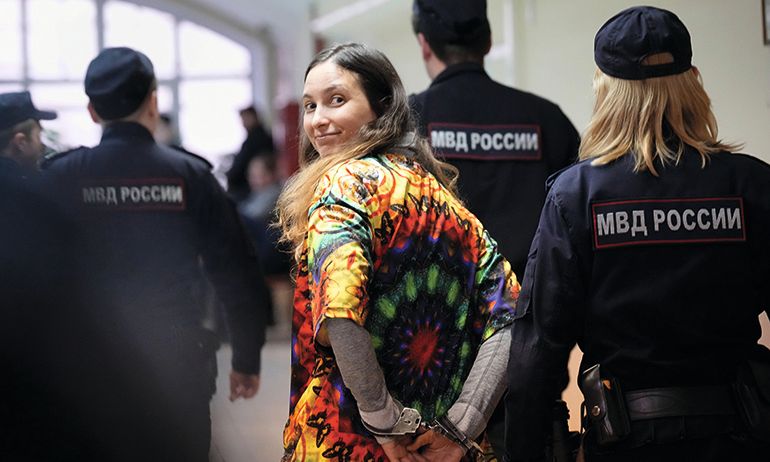Sasha Skochilenko © Associated Press/Alamy Stock
My friend said the best way to express what it means to be an artist in Vladimir Putin’s Russia is to simply repeat SNAFU [Situation Normal All Fucked Up] several hundred times. Overall, this might have been a good decision, but I’d like to add a few things from my own perspective on how artists I know lived in one specific city during Putin’s time.
I believe you don’t need a diploma to prove you’re an artist: your life proves it. I didn’t call myself an artist and didn’t study to become one, but one day the newspapers started writing: “Sasha Skochilenko, an artist from St Petersburg.” It took me a couple of years to accept this. But eventually I quit a good job and the start of an academic career that I once dreamed of, to dive head-first into the rabbit hole of the St Petersburg underground scene, quickly transforming from a hardworking, top-of-the-class girl into a marginal figure.
Skochilenko made a number of artworks while she was imprisoned in Russia, including PTSD (2024)
Courtesy the artist
I lived on the brink of hunger and picked up food from the streets. I thought I’d rather die than only make art on the weekends or in the evenings after work—I wanted to have all the time in the world for it. I would sit in the large atrium where my works were displayed, with my feet wrapped in plastic bags over my socks because I couldn’t afford waterproof shoes. We had a Telegram chat called “Friends Wolf Down”, which brought together the most creative people in the city with a big need for food. We shared sustenance—sometimes the last crumbs we had—old clothes, crappy odd jobs (construction, repairs, delivery, cleaning… flexible hours, cash in hand) and much, much more. We organised holidays for each other and arranged our own events to provide a platform for those who were shut out of the mainstream Russian art world. These events were much more exciting and interesting than any official, meticulously choreographed initiatives in Putin’s gloomy Russia.
This in itself was a protest. We didn’t want to rely on state grants, pay taxes (that go to who knows what), mortgages, loans and all those creepy social institutions. We lived in co-living spaces and communes; I visited places where people rented a mattress or just crashed for free. In these environments, the walls were covered in bizarre patterns and colours, music was played, and the celebration never ended. We desperately wanted to live our best lives; to live while we still could.
But with each passing year, living became harder. Police vans began to appear at the venues where we performed. Every month, they removed words and themes, legally banning us from using them in our work. They took away “war”, “peace”, took away facts and names, took away entire historical events, took away same-sex relationships, which for me meant losing almost all the words of love. Only those who risked their well-being, their freedom and even their lives, remained true artists. Indeed, a hungry artist will paint a still life with apples better than a well-fed one.
Skochilenko's SH(O)UT (2024), also made while she was in prison
Courtesy the artist
Pavel Kushnir was a musician who became a political prisoner. He died during a dry hunger strike in prison on the same day everyone celebrated my release. One life; one death. I am far from the best artist in Russia, I just happened to be the winner of the “Hunger Games”.
I remember how we found so much courage to despise Putin’s laws. How we invented ever more ingenious ways to circumvent the bans. No matter what happens, artists in Russia will steadfastly drift on a small floe, huddling closer together as the edges of the ice break away.
• Sasha Skochilenko was arrested in 2022 and sentenced to seven years in prison for an art intervention opposing Russia’s invasion of Ukraine. She was freed along with the Wall Street Journal writer Evan Gershkovich and 15 others on 1 August. She is now based in Germany

